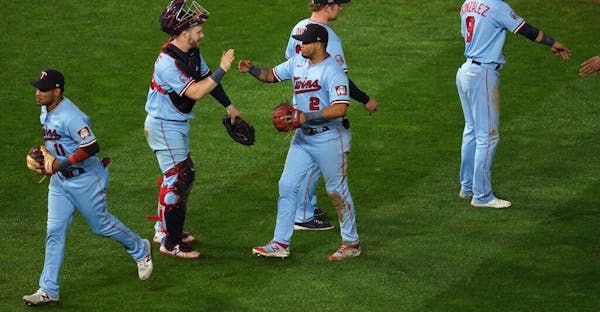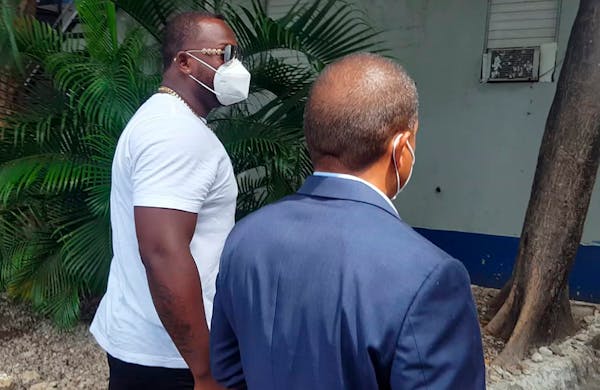In the space of four days, the Twins have received a blueprint for playing baseball in 2020, the go-ahead to implement it — and a vivid reminder that it all could come to a halt at any moment.
The first cases of COVID-19 among Twins players were detected this week, President of Baseball Operations Derek Falvey announced Thursday, and those players — "it was a few," both major and minor leaguers, Falvey said while declining to be more specific — are quarantined until they can clear MLB's virus protocols.
That will require at least two negative test results, spaced a few days apart, so "we are likely to not have our [full] complement of what would have been 60 [players] to start camp" Wednesday at Target Field, Falvey said during a video call with Twins reporters.
The tests were administered "after reporting either close contact with someone who was COVID-positive in one case, and in one [other] case having some level of mild symptoms. … Prior to that, we had no known cases, staff or players or otherwise," Falvey said. "I don't think this is necessarily a surprise that we may have some positive cases. We'd expect it."
The Twins are at least the seventh MLB team to reveal positive tests over the past week, following the Phillies, Blue Jays, Yankees, Red Sox, Mariners and Tigers. Unlike some of the other teams, the Twins players were not exposed to the virus at a team facility but tested positive in their home cities. Regardless, the Twins' offseason headquarters in Fort Myers, Fla., has been closed like all training camps for a thorough cleaning and decontamination.
“It's going to take a real effort and a coordinated effort between players, staff and anyone who ever comes in contact with players to help manage this.”
Teams have been planning for potential outbreaks all along, Falvey said, and everyone realizes that the continued spread of the coronavirus remains a threat to baseball's plans for playing a 60-game season. But "I would say I remain cautiously optimistic as we get everyone back together, if we appropriately follow protocols," Falvey said, including every-other-day virus tests for players. "It's going to take a real effort and a coordinated effort between players, staff and anyone who ever comes in contact with players to help manage this."
The Twins are doing their part over the next week by redesigning Target Field's clubhouses, dugouts and even concourses. Tables, chairs, buffets and anything that encourages players to congregate are being removed from the clubhouse, and outdoor areas are being built to allow players to stretch and warm up at safe distances from each other. Extra bus trips between the team hotel and ballpark will be added on the road, and masks will be provided for when players aren't on the field.
They will be told to spend as much time as possible outdoors at the ballpark, and as little as possible in the clubhouse.
"It's definitely going to be a different kind of normal," Falvey said.
Manager Rocco Baldelli has talked to some players already, and "there's going to be a conversation with every one of our players to say that it's up to every individual in this room, their responsibility is much greater. … What you do away from the park is probably as important or more important than what happens inside our walls."
Inside the wall of his own office, Falvey and his staff are putting together the 60-man camp roster, trying to gauge what players might be useful during the shortened season, and whether they have room to give a few future Twins some early experience, at least on the taxi squad. They have ruled out inviting any of the draftees and amateur free agents added earlier this month, unlike a few other teams, but still figure to add several minor leaguers who would normally be climbing their system.
It's a good bet, for instance, that some players optioned late in camp, such as outfielder LaMonte Wade Jr. and pitchers Sean Poppen and Lewis Thorpe, will be invited to spend the summer in Minneapolis — or St. Paul, more likely, should the Twins finalize an agreement to use the Saints' CHS Field as their taxi squad home once the season begins. And some top prospects, such as Royce Lewis, Trevor Larnach, Ryan Jeffers, Nick Gordon and Alex Kirilloff, who spent much of the spring in major league camp, stand a good chance to be on that list as well.
"It's going to be focused mostly on a group we believe is upper level-ready and closer to the major leagues," Falvey said. "Not everyone will be ready for the major leagues. Clearly we have some prospects in that group that we believe are a little farther away, but we will focus mostly on that group."
Teams can keep 30 players for the first two weeks of the season, then 28 for two more weeks, before cutting to 26 players for the final five weeks.
“What you do away from the park is probably as important or more important than what happens inside our walls.”
It's likely that teams will keep more pitchers than usual, since starting pitchers are unlikely to be ready to pitch seven innings after only three weeks of camp.
Falvey said the Twins are even discussing a six-man pitching rotation, at least for a while.
The addition of veteran lefthander Rich Hill, expected to be ready after missing spring training following offseason elbow surgery, gives them more options, as does the return of nonroster pitcher Jhoulys Chacin, who was hoping to win a rotation spot in Fort Myers.

